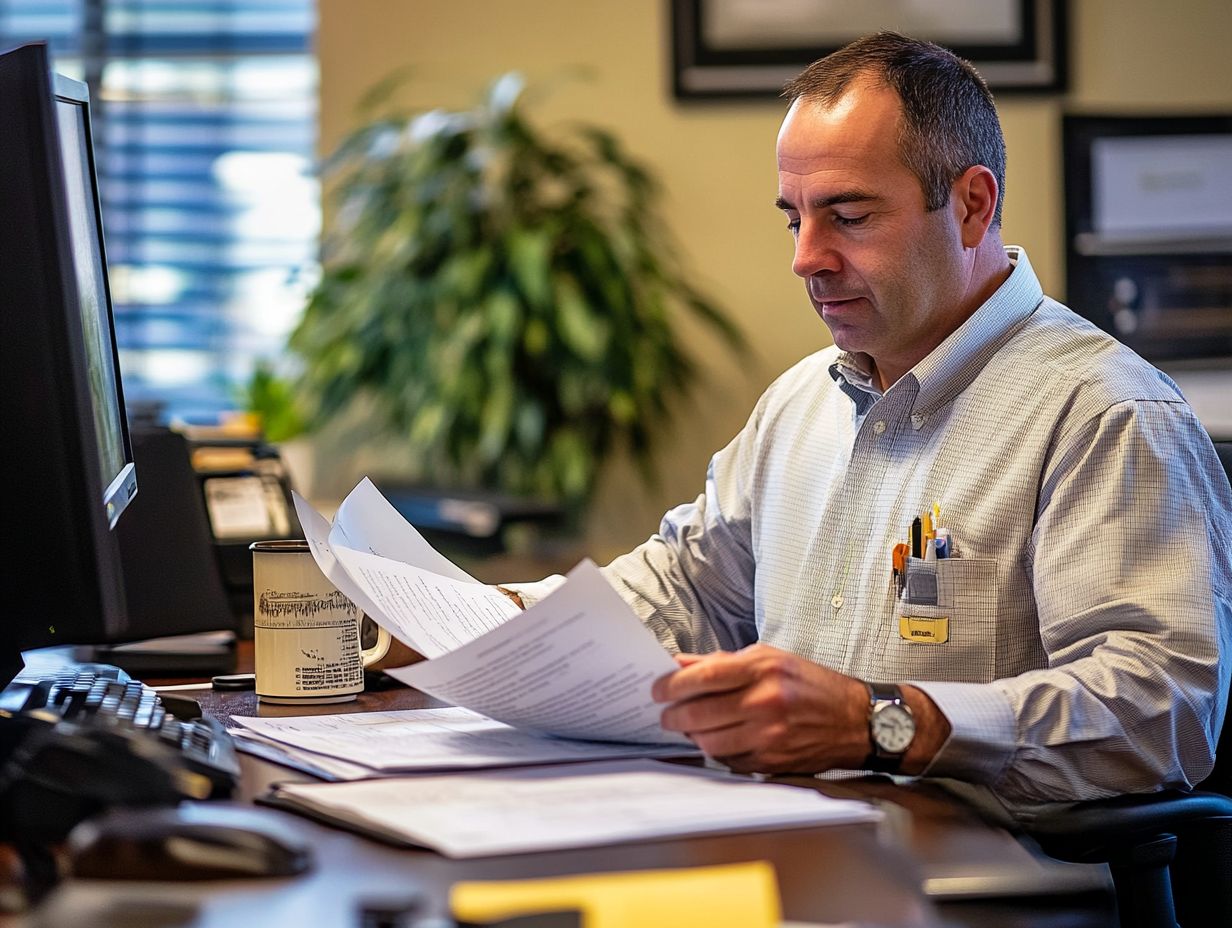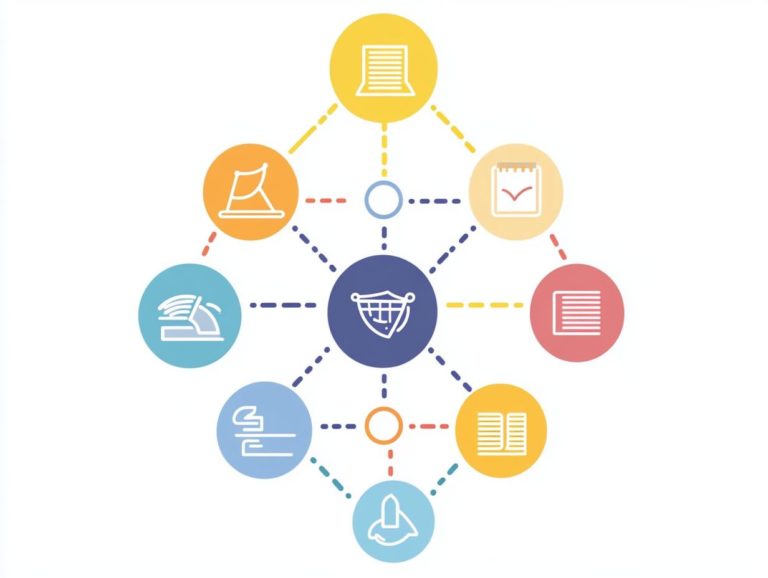Understanding the Role of Claim Adjusters
Claim adjusters serve as vital intermediaries in the insurance industry, connecting policyholders with insurance companies.
Their duties encompass investigating claims, evaluating damages, and negotiating settlements.
This piece delves into the different types of claim adjusters, the qualifications and training necessary for the role, and the unique challenges they encounter daily.
Whether you’re contemplating a career in this field or seeking to grasp the intricacies of claim management, you’ll uncover essential insights that could change your understanding!
Contents
Key Takeaways:

Claim adjusters are responsible for investigating and assessing damages, as well as negotiating settlements for insurance claims. There are two main types of claim adjusters: staff adjusters, who work for insurance companies, and independent adjusters, who work as contractors. To become a claim adjuster, one must meet educational requirements and obtain certifications, as well as undergo continuing education to stay updated on industry practices.
What is a Claim Adjuster?
A claim adjuster is a professional dedicated to evaluating insurance claims on behalf of the insurance company. They determine the extent of the insurer’s liability while ensuring fairness and accuracy in the assessment process. Claim adjusters are key players in making sure claims are handled fairly and efficiently, investigating a wide range of claims related to property damage and personal injuries, which can arise from incidents as diverse as auto accidents to natural disasters like hurricanes.
To effectively carry out their crucial responsibilities, claim adjusters must adhere to state regulations and hold at least a high school diploma, complemented by specialized training and certifications.
These experts are skilled at handling claims, meticulously examining every scenario to guarantee that policyholders receive the coverage they rightfully deserve. Their thorough investigative approach involves gathering evidence, interviewing all parties involved, and assessing damages, all while upholding ethical standards.
The range of claims they handle is impressively varied, spanning from auto accidents to extensive business interruptions. Through their diligent efforts, claim adjusters safeguard the interests of policyholders, ensuring claims are resolved justly and maintaining the integrity of the insurance industry.
Responsibilities of a Claim Adjuster
Claim adjusters play a vital role in the insurance claims process, overseeing a range of essential tasks. They investigate claims, assess damages, and determine liability with precision, as outlined in what role the insurance adjuster plays.
They meticulously gather evidence, from police reports to various forms of documentation, to ensure that the claims evaluation is both thorough and objective.
Adjusters negotiate directly with policyholders, striving to secure fair settlements that adhere to the terms and conditions of the insurance policy.
Investigating Claims and Assessing Damages

Investigating claims and assessing damages is a crucial responsibility for claim adjusters, ensuring that property damage and personal injury claims are thoroughly evaluated.
This process requires a detailed examination of the incident’s circumstances, including gathering relevant evidence and documentation to verify the legitimacy of the claim.
To accurately determine liability, you typically start by interviewing witnesses who can provide firsthand accounts of what happened. This helps establish a clear timeline and context for the events that took place.
Next, you review pertinent documentation, such as police reports, medical records, and invoices, to corroborate the claims being made. Conducting thorough damage inspections is equally important, as physical assessments of the property can unveil the extent of the damage and its potential causes.
By adhering to established insurance regulations throughout this investigative process, you ensure compliance and maintain the integrity of the claims assessment, ultimately leading to fair outcomes for everyone involved.
Negotiating Settlements
Settlement negotiation plays an important role in your work as a Claim Adjuster. Your goal is to reach a fair settlement that aligns with the terms of the insurance policy.
This often involves discussions with policyholders, ensuring their interests are represented while also following your insurance company’s claims management protocols.
Navigating these discussions requires a delicate balance. You must be mindful of company guidelines while advocating for the policyholder’s needs.
Effective strategies include:
- Practicing active listening
- Explaining difficult insurance terms
Clear communication is essential. It fosters trust and understanding among all parties involved. Careful note-taking of conversations and agreements is important because it helps resolve disputes and achieve satisfactory outcomes.
This diligence ensures that both the policyholder and the insurance company feel their perspectives are acknowledged and validated.
Types of Claim Adjusters
Within the insurance industry, you’ll encounter several types of Claim Adjusters, each playing a unique role in the claims process, including a detailed understanding of what’s the role of an insurance adjuster.
- Staff adjusters are employed directly by an insurance company, ensuring that claims align with company policies.
- Independent adjusters work as contractors, managing claims on behalf of insurers.
- Public adjusters advocate for policyholders throughout the claims journey, ensuring their clients receive fair treatment.
Staff Adjusters

Staff Adjusters are essential for a smooth claims process! They manage claims right from within the organization and thoroughly understand company policies and procedures.
Their main duties involve investigating claims, assessing damages, and determining who is responsible for the damages based on employer standards. Beyond these responsibilities, they play a key role in claims management, ensuring each claim is handled efficiently and fairly.
They must navigate the complexities of insurance regulations while adhering to best practices in claims procedures. Every step taken during their assessments is well-documented, which streamlines workflow and boosts the accuracy of evaluations.
Their expertise significantly influences customer satisfaction. Effective communication with claimants about their claims is crucial for building trust. Ultimately, the role of staff adjusters is vital for creating a smoother claims experience.
Independent Adjusters
Independent Adjusters function as third-party contractors, offering specialized claims expertise to insurance companies, especially during peak periods or natural disasters.
They conduct thorough claims investigations, ensuring fair assessments of property damage and personal injuries. Their qualifications typically include substantial industry experience, professional certification, and a deep understanding of various types of claims, making them invaluable assets in high-pressure situations.
By operating independently, they can adapt to fluctuating workloads and manage multiple clients an essential capability during catastrophic events when resources are stretched thin. This flexibility allows them to respond quickly to claims recovery processes.
Their impartiality builds trust among policyholders, promoting a transparent and efficient investigative process that ultimately leads to better outcomes for everyone involved.
Qualifications and Training for Claim Adjusters
To succeed as a Claim Adjuster, you need to meet certain qualifications. This includes obtaining a high school diploma and passing the state-regulated adjuster exam, which tests your understanding of insurance regulations and claims procedures.
Additionally, continuing education is crucial. It allows you to stay informed about industry changes and refine your skills to remain competitive in the field.
Ready to dive into a rewarding career as a Claim Adjuster? Let s explore the qualifications you need!
Educational Requirements

To become a Claim Adjuster, start with a high school diploma. Then, pursue specialized training programs to learn about insurance adjuster responsibilities.
Many states require you to pass a licensing exam. This ensures you’re knowledgeable about regulations and the insurance claims process.
If you’re serious about standing out, consider formal degree programs in business, finance, or risk management. Community colleges and vocational schools often offer tailored training for insurance adjusters.
Getting certified from the National Association of Independent Insurance Adjusters can enhance your qualifications. This certification keeps you informed about industry standards, giving you a competitive edge.
Certifications and Continuing Education
Certifications and ongoing education are key to your success as a Claim Adjuster. They enhance your marketability and ensure you stay well-informed about evolving standards and practices in the insurance industry.
Many adjusters also earn additional certifications to specialize in areas like property damage, personal injuries, and complex claims management. These qualifications boost your credibility and equip you with the latest techniques in claims investigation and settlement negotiation.
Engaging in ongoing training allows you to refine your skills and stay updated on regulatory changes. Embracing new technologies streamlines your workflow.
This commitment to lifelong learning enables you to deliver exceptional service to your clients and positions you favorably in a competitive job market, making you an invaluable asset to your employer.
Challenges Faced by Claim Adjusters
As a Claim Adjuster, you face thrilling challenges that test your skills! You encounter a variety of situations that can significantly affect your efficiency in managing claims, especially when navigating difficult clients and heavy workloads.
The insurance claims process is often complex and emotionally charged. You must skillfully handle sensitive situations while upholding professionalism and adhering to company policies.
Dealing with Difficult Clients
Dealing with difficult clients is a familiar challenge for you as a Claim Adjuster, especially when policyholders are distressed by property damage or personal injuries. It’s crucial to harness effective communication and negotiation skills to de-escalate emotional situations and cultivate a cooperative environment.
To manage these interactions effectively, employ strategies like active listening and demonstrating genuine empathy. These approaches greatly enhance your rapport with clients.
Thoughtfully acknowledging their concerns validates their feelings and builds a foundation of trust. Utilizing open-ended questions allows clients to express themselves freely, providing essential information for the claims investigation.
Maintaining a calm demeanor and using clear, jargon-free language helps alleviate confusion and frustration. This approach fosters smoother negotiations and leads to resolutions that satisfy everyone involved.
Managing Heavy Workloads
Managing heavy workloads is a challenge for you as a Claim Adjuster, especially during busy times after disasters.
Effective time management is key to handling multiple claims while ensuring thorough investigations and timely settlements.
By prioritizing tasks, blocking out time, and delegating responsibilities, you can boost your productivity significantly.
Assessing the urgency and complexity of each claim helps you allocate your time effectively. This ensures that critical cases get immediate attention.
Digital tools can streamline your workflow and reduce stress during high work volumes.
When you tailor these methods to your needs, you can take control of your workload and improve the insurance process, leading to faster resolutions and happier customers.
Frequently Asked Questions
- What is the role of a claim adjuster? A claim adjuster investigates insurance claims to determine the payout amount for a covered loss.
- What qualifications do claim adjusters typically have? Most claim adjusters have a college degree and may need a license in their state. They also undergo extensive training.
- What types of claims do adjusters handle? Adjusters manage various claims, including property damage, personal injury, and liability. They may specialize in areas like auto, home, or commercial insurance.
- What is the process for filing a claim with an adjuster? To file a claim, contact your insurance company and provide details of the loss. They will assign a claim adjuster to investigate.
- How do claim adjusters determine the value of a claim? They evaluate damage, review policy coverage, and research similar claims to determine value.
- What is the role of a claim adjuster in the insurance claims process? Claim adjusters assess claims, determine payouts, and ensure timely, fair handling for everyone involved.
For more resources or assistance with claims, feel free to contact us!


